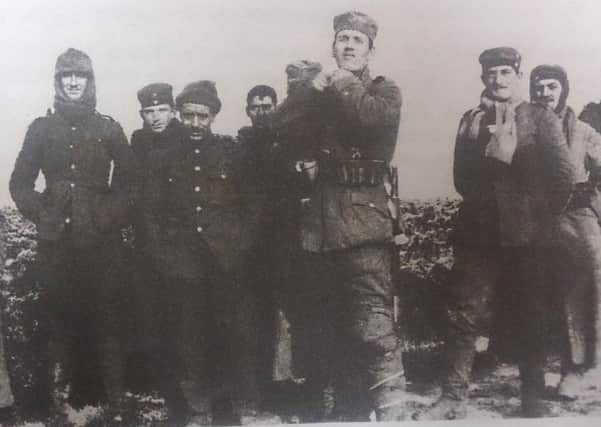Larne war historian examines 1914 Christmas truce


This year marks the 100th anniversary of the 1914 Christmas truce, which saw British and German soldiers on the Western Front venture out of the trenches into No Man’s Land to exchange seasonal greetings and even play impromptu games of football. Larne his
This has become one of the most famous and mythologised events of the First World War. But what was the real story behind the truce? Why did it happen and did British and German soldiers really play football together in No Man’s Land?
Advertisement
Hide AdAdvertisement
Hide AdDuring World War One in and around Christmas Day 1914, the sound of rifles and machine guns firing, as well as shells exploding, ceased in a number of places along the Western Front in favour of holiday celebrations and gestures of goodwill between enemies.
Starting on Christmas Eve, many Germans and British troops sang Christmas carols to each other across the lines and at certain points the Allied soldiers even heard brass bands joining the Germans in their carol singing.
The first carol, ‘Stille Nacht’ (Silent Night) was first heard being sung by a lone German soldier and everyone else joined in. The Allied forces replied with ‘O Come All Ye Faithful’ and many others were sung with their voices drifting across No Man’s Land, which was only an approximate distance of between 80-100 yards from trench to trench.
At the first light of dawn on Christmas Day, some of the German soldiers approached the Allied lines across No Man’s Land calling out in English “Merry Christmas”. At first the Allied soldiers feared it was a trick, but seeing the Germans unarmed, they climbed out of their trenches and shook hands with the Germans.
Advertisement
Hide AdAdvertisement
Hide AdThey exchanged presents of cigarettes and plum puddings and sang carols and songs. It is even documented that a good natured game of football
was played between
opposing sides.
Some soldiers used the short-lived ceasefire for a more sober task of retrieving the bodies of fallen men who were still lying between the trenches.
The Christmas truce of 1914 came only five months after the outbreak of the war and was one of the last between enemies in warfare. It should also be remembered that while the truce was widespread, it was not total, as in some parts the shelling and firing continued during the day.
In some sections of the line British soldiers were perplexed by the sudden appearance of lights in the German trenches, before realising that the enemy had put up
Christmas trees.
Advertisement
Hide AdAdvertisement
Hide AdAlmost all accounts of the truce suggest it was a German initiative, as German units contained men who had learned English when working
in Britain.
Men who a day or so earlier would have liked nothing more than to put a bullet in the man beside them now stood showing off photographs of their families and in some areas along the front they even shared Christmas dinner in
No Man’s Land.
A letter written by a British soldier details how the truce came about: “On Christmas Eve the firing practically ceased. I think both sides understood we were going to have a day off. Through the night we sang carols to one another. The German lines were only a hundred yards away so we heard each other quite plainly. This went on all night. When dawn arrived we started putting our heads above the parapet and waved to each other. On our left was a brewery occupied by the Germans and to our surprise we saw a German come out and hold up his hand, and behind him there were two Germans rolling a barrel of beer. They came halfway across and signed for us to come for it.
“Three of us went out and shook hands with them, wished them a Merry Christmas and rolled the barrel to our own trenches amid the cheers of both German and British soldiers.
Advertisement
Hide AdAdvertisement
Hide Ad“After that it was understood that peace was declared for a day. We both got out of our trenches and met in No Man’s Land and wished each other seasons greetings.
“Some of the Germans were quite good at speaking English. We had a most interesting day and the Germans got permission from our officers to bury some of their dead which were lying near our lines.”
Another soldier wrote of his experience of the ceasefire: “On Christmas Day the German soldiers came out of their trenches and held their hands up. Our boys immediately got out of their trenches and we met in the middle, and for the rest of the day we fraternised, exchanging food, cigarettes and souvenirs. The Scotsmen started playing their bagpipes and we had a great day, which included a football match with the Germans. The game of football was played at Wulvergem.
“The Germans said they were tired of the war and wished it was all over.”